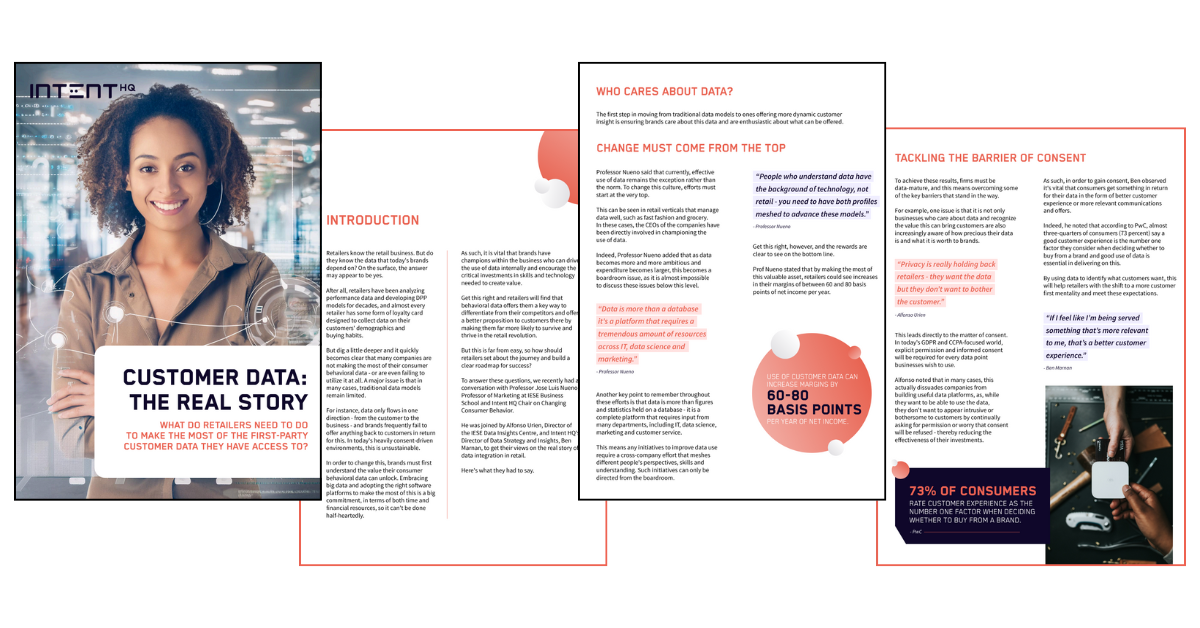You’ve probably heard the phrase ‘data is the new oil’, which refers to the fact that digital information has become many businesses’ most valuable asset. This is particularly true of the records enterprises hold about their customers, which are often the crown jewels of any brand’s data holdings.
The importance of a customer intelligence platform
This data in its simplest form can give critical insights into who your customers are and what they want. It can tell you their demographic profile, their purchasing behavior, their transaction history and categorize them into segments. Some Customer Intelligence Platforms can also apply AI to further develop your customer insights such as personality traits, lifestage analytics, understanding the interests and the brands they aspire to and use frequently; and in some cases predict their future intentions.
All this is vital information for marketers as it helps them craft much more personalized, relevant campaigns that match an individual’s needs. However, this data is often held in siloed data stores, making it impossible to achieve this without the right tools.
An effective customer analytics platform needs to be at the heart of this. While some firms could build one from scratch, this is a hugely costly and time-consuming process. For most businesses, buying a ready-made solution is therefore the best answer. This often comes in the form of an advanced customer intelligence platform that can provide an easy solution to manage all your critical data.
Key elements to look for in a customer intelligence solution
Not all customer intelligence platforms are equal. While there are many vendors out there offering to provide you with extensive insight into your data, their capabilities can vary widely. Therefore, if you are looking to make the most of your data assets to find what customers really want, there are a few key factors you should bear in mind.
Below, we’ve put together some of the most important things you should be looking for and why you need them. Keep them in mind while searching for the best option for your needs and you stand a much better chance of success when it comes to leveraging your data to optimize business value.
- Speed
The first crucial factor to understand is the importance of timeliness to your requirements. This will depend on how you intend to use the insights and in which channels. Delivering the right offer to the right customer is only half the challenge. If it isn’t presented to them when they need it most, the effort is wasted. In an e-commerce situation, your customer intelligence platform may need to be able to deliver in-the-moment results that deliver an additional layer of relevance to the customer at point of transaction. For more considered purchases, your window of opportunity to serve the right product, message or experience might be days or even weeks.
Your requirements for speed are therefore influenced by the use cases you wish to achieve. Think carefully about this before deciding on your needs for a customer intelligence platform.
- Scale
How many data points do you have on your customers? For large enterprises with millions of users, the answer could easily be billions, or even trillions. Buried somewhere within this is the insight you need, but if your tools can’t access all of this, it could be like looking for a needle in a haystack.
The ability to collate data from across the business and build a complete, 360-degree view of the customer at scale – without sacrificing your speed requirements mentioned above – is essential to delivering real insight that is relevant to your customers. But that is only half the story. You need to balance this with the ability for the customer intelligence platform to extract the signal from this huge data lake. A good platform that removes the noise, keeping the signal and then enhancing it into quality insights is the key to success. This helps you create much more in-depth behavioral segmentation and spot potential opportunities deep within the data.
- User-friendliness
Good data scientists are hard to find. While it’s essential you have the right expertise on board to make the most of your customer data, this doesn’t mean everything should be left to these professionals. If all your analytics have to be run via these teams, this not only makes the process slower, but adds an extra step to the chain between the insight and the people who need to use it. A customer intelligence platform does not replace those people. It does the hard laborious work, often crunching volumes of data that a human would not be able to do, allowing team members to do more useful strategy work.
An effective platform should therefore put insights directly in the hands of employees who will use it most – marketers, customer experience pros and customer support teams. An easy-to-understand, visual interface should enable anyone to query the data, while still providing the depth demanded by power users like data scientists.
- Privacy
Finally, privacy is a factor that must not be overlooked, particularly if your customers fall under the jurisdiction of GDPR, CCPA, or one of the many other rigorous data privacy laws around the world. Both regulators and consumers now have very high demands of businesses when it comes to protecting their data, and customers will quickly decline personalization if they believe their personal information is being misused.
As well as tough security measures such as encryption and access control, the ability to provide compelling privacy-enhancing technologies, such as effectively removing or anonymizing an individual’s sensitive data while still being able to run analytics at scale is essential to the value exchange with your customers. How providers handle privacy enhancing technologies should be among the first questions you ask any potential partner, as the reputational and financial consequences of failure in this area can be high.




